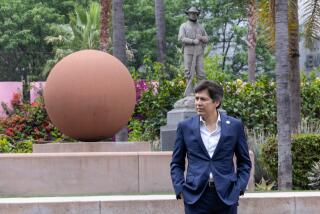Racial Issues Circle Around Atlanta’s Airport and Mayors’ Legacies
- Share via
ATLANTA — It took little time following the death of former Mayor Maynard Jackson Jr. for admirers to suggest what they saw as a perfect tribute to Atlanta’s first black mayor: placing his name on the city’s international airport.
Jackson had taken special pride in advances at the airport during his three terms as mayor, which began in 1974. A huge expansion turned the facility into a world-class hub, and Jackson struck a blow for black empowerment by insisting that minority contractors get a share of the lucrative airport business.
His lasting affection for the airport was so strong, according to friends and family, that Jackson made it clear he would like his name placed on it someday.
“He felt the activity, the affirmative action, the overall development of the airport that took place under his watch warranted that his name be there,” said C.T. Martin, an Atlanta city councilman.
There is only one problem. The airport already bears the name of another former Atlanta mayor: William B. Hartsfield, a long-reigning leader who is considered the father of aviation in the city and who viewed the airport as his baby.
The proposal to rename the airport has produced a sharp debate over whether honoring one mayor means pushing aside the legacy of another, and in the process doing a disservice to the city’s history. Some worry that the charged discussion will break along color lines in a city that likes to play up its history of relative comity on racial matters. Hartsfield, who served as mayor from 1937 to 1962 with a brief interruption, was white.
“It’s become a very contentious issue,” said William Boone, an associate professor of political science at Clark Atlanta University. “It’s become very polarizing.”
Mayor Shirley Franklin has named a commission to recommend appropriate tributes for Jackson, who died June 23 at age 65, and another former mayor, Ivan Allen Jr. Allen, who was mayor for most of the 1960s, passed away just nine days after Jackson, at age 92.
So far, the proposal to rename the airport, which handles more passengers than any in the world, is virtually the only idea anybody has talked about. Early mail to Franklin’s office heavily favored keeping its current name, Hartsfield Atlanta International Airport. But the commission’s initial hearing two weeks ago was dominated by appeals to rename the airport for Jackson in the interests of Atlanta’s black majority.
“This really shouldn’t be about what the white business establishment would allow,” state Rep. “Able” Mable Thomas was quoted as telling the panel. “It’s really what the strength of the African American community will allow. What will we stand for?”
Critics accused proponents of creating a divisive climate in which to select a fitting salute to Jackson. “Sadly, once the race card is played, it’s extremely hard to take back,” a scolding editorial in the Atlanta Journal-Constitution said.
Sam Massell, a former mayor who put Hartsfield’s name on the airport and was unseated by Jackson in 1973, said the issue threatened to generate animosities like those seen in the recent fight over returning the Confederate emblem to prominence on the state flag. That would be “very sad,” he said, adding, “We’ve come a long way in this city in race relations and respect for each other.”
Massell said it would be wrong to remove Hartsfield’s name or add Jackson’s in tandem, as some have suggested. “To change the name or dilute Hartsfield’s recognition would be a terrible mistake and an insult,” he said.
There is symbolic value in whose name is on the airport, which embodies perhaps more than any other city institution Atlanta’s aspiration to be a world player. “The airport is a symbol of Atlanta, held in a kind of reverence by many people,” said Boone, the political scientist. “It put Atlanta on the map ... so it’s important.”
No one disputes that both Hartsfield and Jackson played important roles in the airport’s development. Hartsfield was a City Council member in the 1920s when he negotiated the deal that put the site in the city’s hands. An aviation buff, he lobbied for improvements over the years that helped pave the way for the transformation of the airport -- and the city -- into a major center.
It was under Jackson that the airport expanded with a new terminal complex in 1980 and an international terminal that opened before the 1996 Olympics here. Jackson shook up the establishment by bringing affirmative action to the awarding of city contracts; the share going to minority businesses went from less than 1% to 39% in five years. The policies alienated many in the city’s white power structure but helped cultivate a new generation of black entrepreneurs.
Putting Jackson’s name on the airport would underscore his civil rights legacy and provide the world with an apt symbol for the city, backers say.
“It represents the current history of Atlanta and what Atlanta stands for,” said Aaron Turpeau, a businessman who held several posts under Jackson. “It sends a message of fair and equal treatment of people and economic justice.”
The 17-member mayoral commission is to make its recommendations to the City Council in five weeks or so, following more public sessions, including one Thursday. First, the panel must sift through more than 2,000 comments from residents.
A.D. “Pete” Correll, chief executive of Georgia-Pacific and commission co-chairman, said the decision would not hinge simply on which mayor got the most votes.
Correll expressed surprise at the barbed tone of the early discussion, but said the deliberations needn’t end that way. “I’m not discouraged yet,” he said.
More to Read
Sign up for Essential California
The most important California stories and recommendations in your inbox every morning.
You may occasionally receive promotional content from the Los Angeles Times.













